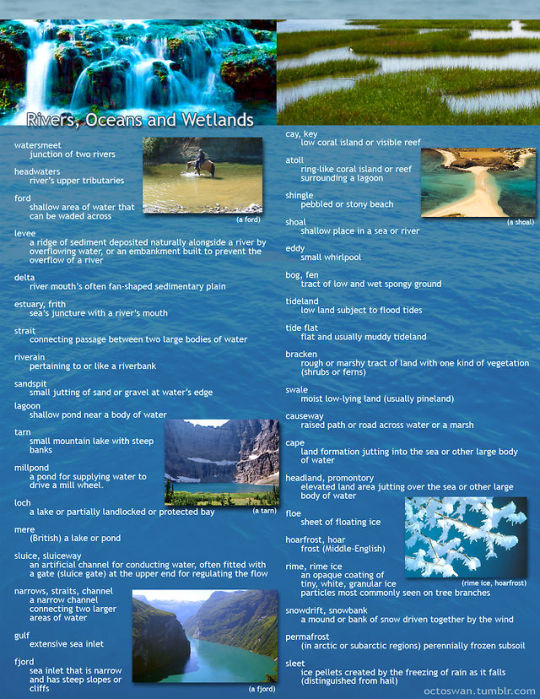Don't wanna be here? Send us removal request.
Text

I haven't watched the episode, didn't even know there were new episodes releasing these days, then a celebratory clip appears on my feed and this was literally my reaction
11K notes
·
View notes
Photo





I made these as a way to compile all the geographical vocabulary that I thought was useful and interesting for writers. Some descriptors share categories, and some are simplified, but for the most part everything is in its proper place. Not all the words are as useable as others, and some might take tricky wording to pull off, but I hope these prove useful to all you writers out there!
(save the images to zoom in on the pics)
215K notes
·
View notes
Text
my writing fundamentally changed forever ten years ago when i realized you could use sentence structure to control people’s heart rates. is this still forbidden knowledge or does everyone know it now
54K notes
·
View notes
Text





Avatar kids 💖
Yes, I know zuko’s scar is on the wrong side
3K notes
·
View notes
Text
tips for choosing a Chinese name for your OC when you don’t know Chinese
This is a meta for gifset trade with @purple-fury! Maybe you would like to trade something with me? You can PM me if so!
Choosing a Chinese name, if you don’t know a Chinese language, is difficult, but here’s a secret for you: choosing a Chinese name, when you do know a Chinese language, is also difficult. So, my tip #1 is: Relax. Did you know that Actual Chinese People choose shitty names all the dang time? It’s true!!! Just as you, doubtless, have come across people in your daily life in your native language that you think “God, your parents must have been on SOME SHIT when they named you”, the same is true about Chinese people, now and throughout history. If you choose a shitty name, it’s not the end of the world! Your character’s parents now canonically suck at choosing a name. There, we fixed it!
However. Just because you should not drive yourself to the brink of the grave fretting over choosing a Chinese name for a character, neither does that mean you shouldn’t care at all. Especially, tip #2, Never just pick some syllables that vaguely sound Chinese and call it a day. That shit is awful and tbh it’s as inaccurate and racist as saying “ching chong” to mimic the Chinese language. Examples: Cho Chang from Harry Potter, Tenten from Naruto, and most notorious of all, Fu Manchu and his daughter Fah lo Suee (how the F/UCK did he come up with that one).
So where do you begin then? Well, first you need to pick your character’s surname. This is actually not too difficult, because Chinese actually doesn’t have that many surnames in common use. One hundred surnames cover over eighty percent of China’s population, and in local areas especially, certain surnames within that one hundred are absurdly common, like one out of every ten people you meet is surnamed Wang, for example. Also, if you’re making an OC for an established media franchise, you may already have the surname based on who you want your character related to. Finally, if you’re writing an ethnically Chinese character who was born and raised outside of China, you might only want their surname to be Chinese, and give them a given name from the language/culture of their native country; that’s very very common.
If you don’t have a surname in mind, check out the Wikipedia page for the list of common Chinese surnames, roughly the top one hundred. If you’re not going to pick one of the top one hundred surnames, you should have a good reason why. Now you need to choose a romanization system. You’ll note that the Wikipedia list contains variant spellings. If your character is a Chinese-American (or other non-Chinese country) whose ancestors emigrated before the 1950s (or whose ancestors did not come from mainland China), their name will not be spelled according to pinyin. It might be spelled according to Wade-Giles romanization, or according to the name’s pronunciation in other Chinese languages, or according to what the name sounds like in the language of the country they immigrated to. (The latter is where you get spellings like Lee, Young, Woo, and Law.) A huge proportion of emigration especially came from southern China, where people spoke Cantonese, Min, Hakka, and other non-Mandarin languages.
So, for example, if you want to make a Chinese-Canadian character whose paternal source of their surname immigrated to Canada in the 20s, don’t give them the surname Xie, spelled that way, because #1 that spelling didn’t exist when their first generation ancestor left China and #2 their first generation ancestor was unlikely to have come from a part of China where Mandarin was spoken anyway (although still could have! that’s up to you). Instead, name them Tse, Tze, Sia, Chia, or Hsieh.
If you’re working with a character who lives in, or who left or is descended from people who left mainland China in the 1960s or later; or if you’re working with a historical or mythological setting, then you are going to want to use the pinyin romanization. The reason I say that you should use pinyin for historical or mythological settings is because pinyin is now the official or de facto romanization system for international standards in academia, the United Nations, etc. So if you’re writing a story with characters from ancient China, or medieval China, use pinyin, even though not only pinyin, but the Mandarin pronunciations themselves didn’t exist back then. Just… just accept this. This is one of those quirks of having a non-alphabetic language.
(Here’s an “exceptions” paragraph: there are various well known Chinese names that are typically, even now, transliterated in a non-standard way: Confucius, Mencius, the Yangtze River, Sun Yat-sen, etc. Go ahead and use these if you want. And if you really consciously want to make a Cantonese or Hakka or whatever setting, more power to you, but in that case you better be far beyond needing this tutorial and I don’t know why you’re here. Get. Scoot!)
One last point about names that use the ü with the umlaut over it. The umlaut ü is actually pretty critical for the meaning because wherever the ü appears, the consonant preceding it also can be used with u: lu/lü, nu/nü, etc. However, de facto, lots of individual people, media franchises, etc, simply drop the umlaut and write u instead when writing a name in English, such as “Lu Bu” in the Dynasty Warriors franchise in English (it should be written Lü Bu). And to be fair, since tones are also typically dropped in Latin script and are just as critical to the meaning and pronunciation of the original, dropping the umlaut probably doesn’t make much difference. This is kind of a choice you have to make for yourself. Maybe you even want to play with it! Maybe everybody thinks your character’s surname is pronounced “loo as in loo roll” but SURPRISE MOFO it’s actually lü! You could Do Something with that. Also, in contexts where people want to distinguish between u and ü when typing but don’t have easy access to a keyboard method of making the ü, the typical shorthand is the letter v.
Alright! So you have your surname and you know how you want it spelled using the Latin alphabet. Great! What next?
Alright, so, now we get to the hard part: choosing the given name. No, don’t cry, I know baby I know. We can do this. I believe in you.
Here are some premises we’re going to be operating on, and I’m not entirely sure why I made this a numbered list:
Chinese people, generally, love their kids. (Obviously, like in every culture, there are some awful exceptions, and I’ll give one specific example of this later on.)
As part of loving their kids, they want to give them a Good name.
So what makes a name a Good name??? Well, in Chinese culture, the cultural values (which have changed over time) have tended to prioritize things like: education; clan and family; health and beauty; religious devotions of various religions (Buddhism, Taoism, folk religions, Christianity, other); philosophical beliefs (Buddhism, Confucianism, etc) (see also education); refinement and culture (see also education); moral rectitude; and of course many other things as the individual personally finds important. You’ll notice that education is a big one. If you can’t decide on where to start, something related to education, intelligence, wisdom, knowledge, etc, is a bet that can’t go wrong.
Unlike in English speaking cultures (and I’m going to limit myself to English because we’re writing English and good God look at how long this post is already), there is no canon of “names” in Chinese like there has traditionally been in English. No John, Mary, Susan, Jacob, Maxine, William, and other words that are names and only names and which, historically at least, almost everyone was named. Instead, in Chinese culture, you can basically choose any character you want. You can choose one character, or two characters. (More than two characters? No one can live at that speed. Seriously, do not give your character a given name with more than two characters. If you need this tutorial, you don’t know enough to try it.) Congratulations, it is now a name!!
But what this means is that Chinese names aggressively Mean Something in a way that most English names don’t. You know nature names like Rose and Pearl, and Puritan names like Wrestling, Makepeace, Prudence, Silence, Zeal, and Unity? I mean, yeah, you can technically look up that the name Mary comes from a etymological root meaning bitter, but Mary doesn’t mean bitter in the way that Silence means, well, silence. Chinese names are much much more like the latter, because even though there are some characters that are more common as names than as words, the meaning of the name is still far more upfront than English names.
So the meaning of the name is generally a much more direct expression of those Good Values mentioned before. But it gets more complicated!
Being too direct has, across many eras of Chinese history, been considered crude; the very opposite of the education you’re valuing in the first place. Therefore, rather than the Puritan slap you in the face approach where you just name your kid VIRTUE!, Chinese have typically favoured instead more indirect, related words about these virtues and values, or poetic allusions to same. What might seem like a very blunt, concrete name, such as Guan Yu’s “yu” (which means feather), is actually a poetic, referential name to all the things that feathers evoke: flight, freedom, intellectual broadmindness, protection…
So when you’re choosing a name, you start from the value you want to express, then see where looking up related words in a dictionary gets you until you find something that sounds “like a name”; you can also try researching Chinese art symbolism to get more concrete names. Then, here’s my favourite trick, try combining your fake name with several of the most common surnames: 王,李,陈. And Google that shit. If you find Actual Human Beings with that name: congratulations, at least if you did f/uck up, somebody else out there f/ucked up first and stuck a Human Being with it, so you’re still doing better than they are. High five!
You’re going to stick with the same romanization system (or lack thereof) as you’ve used for the surname. In the interests of time, I’m going to focus on pinyin only.
First let’s take a look at some real and actual Chinese names and talk about what they mean, why they might have been chosen, and also some fictional OC names that I’ve come up with that riff off of these actual Chinese names. And then we’ll go over some resources and also some pitfalls. Hopefully you can learn by example! Fun!!!

Let’s start with two great historical strategists: Zhuge Liang and Zhou Yu, and the names I picked for some (fictional) sons of theirs. Then I will be talking about Sun Shangxiang and Guan Yinping, two historical-legendary women of the same era, and what I named their fictional daughters. And finally I’ll be talking about historical Chinese pirate Gan Ning and what I named his fictional wife and fictional daughter. Uh, this could be considered spoilers for my novel Clouds and Rain and associated one-shots in that universe, so you probably want to go and read that work… and its prequels… and leave lots of comments and kudos first and then come back. Don’t worry, I’ll wait.
(I’m just kidding you don’t need to know a thing about my work to find this useful.)

Keep reading
40K notes
·
View notes
Text
every culture has their ethnic donut and every culture has their ethnic dumpling… humans be frying dough
277K notes
·
View notes
Text
It is increasingly obvious that most people have no idea how to indicate an illness is slowly killing someone without making them cough up blood. Doesn’t matter what it is or if it has anything to do with your respiratory system, if you’re dying, you’re coughing up blood.
110K notes
·
View notes
Text
You ever fuck up and read some Mary Oliver while in a vulnerable mood
682 notes
·
View notes
Text
One of the best things I’ve ever written (in my opinion) was actually for a creative writing assignment that I did at the last minute because I had a big project for a “more important” class that ate up my writing time.
With very little time to get the assignment done, and a brain that was both overworked and sleep-deprived, I wrote some extremely vague piece about someone who is alone in a forest, deathly afraid of every broken twig and some indistinct “other”. When I wrote it, it felt lazy and ill-conceived, but I sent it to my assigned writing group and went back to my “more important” work without a second thought.
My writing group loved it. They said it was spooky and mysterious, and they all wanted to know what the creepy thing was in the woods. At this point, a more savvy creative might have played coy, saying that it was a metaphor, or that the audience can decide with their imagination, or maybe even just made something up on the spot. But I have what is affectionately referred to as an “honest face”, which means I’m shit at lying. So I told them the truth:
“I have no idea.”
They seemed surprised by that, but the truth was, I had written the story to be vague and mysterious specifically to avoid explaining things. Oh, the character doesn’t describe what she saw between the trees? That was because I couldn’t think of a single god damn thing for her to see between the trees. The character worries about “it” happening “again”? I needed to fill out that paragraph a bit but couldn’t think of anything for her to worry about, so I essentially popped in “Once again, she worried about a Thing.” I was simplistic with the whole thing, because I hadn’t wanted to work out a logical story line. I had been so stressed, so brain-dead, that I literally didn’t have the creative energy to invent anything coherent. So I just... didn’t. I expected them to see through me, laugh it off as “one of those weeks!” and move on with my life, but instead they thought it was great.
That was when I realised I tended to over-think my writing. It turns out, if you leave spaces in your stories, readers will fill them. One of the people in my group had been certain the character was hiding from vampires (I had made an allusion to mist, because it had been misty that morning as I’d walked to work). Another mentioned zombies, another a nuclear apocalypse, while a third person thought it was just about some person who got lost in the woods and was actually just scared of bears. They had apparently talked about it before I arrived, wondering what the true answer was, and were legitimately disappointed when I admitted that the answer was... nothing. It was a weird experience for me, but now when I re-read that piece, I feel fondness.
I no longer have the brain power required to finish this post. So I’ll end it here. Who knows? Maybe it’ll be better off this way.
0 notes
Text
folks, someday you are gonna be writing, and you're gonna put something on paper and hear a voice say "i know this is what you want, but will people like it?" and im here to tell you that is the DEVIL talking and you do whatever you damn well please
49K notes
·
View notes
Text
tip
go to this website
click the phrase generator and do this

endless supply of dnd spells

Some are more helpful than others, but hey.
19K notes
·
View notes
Text
I love the kryn dynasty, they really went “let’s make this 22 year old grad student the head of the FBI” and genuinely didn’t think he’d betray them when they denied his research grant
9K notes
·
View notes
Text
The unplanned fourth part to my apparently-a-series on Essek Thelyss in the context of real-world espionage (parts 1, 2, and 3), today we look at an aspect of his story that doesn’t always apply in a D&D world: how do you prosecute espionage?
Psych! That’s not the real question. The real question is: do you prosecute espionage? The answer is a) not as obvious as it might seem; and b) going to differ between D&D and the real world, because D&D governments are storytelling tools and IRL governments are…not.
The benefits of prosecuting espionage are obvious: the interests of justice are served, the person responsible can be punished appropriately and in accordance with the law, the full extent of their crimes are revealed (including potentially exonerating other suspects), counterintelligence gets to chalk up a win, and other people thinking about committing espionage themselves are hopefully discouraged. But there are a surprising number of arguments in the “against” column.
Some agencies that identify enemy assets want to leave them in place for their own purposes. For about 20 years during the Cold War CIA reserved the right to just plain not tell the Department of Justice if they had proof someone was engaged in espionage because they wanted the opportunity to turn them as double agents, feed them misinformation, etc. rather than outing and punishing them (President Gerald Ford ended this arrangement by executive order in 1976). This isn’t necessarily a good idea IRL, but it forms the bread and butter of RPG espionage storylines and is definitely something to think about in a D&D context.
In the real world, ideally someone can only be found guilty of a crime and punished accordingly after a trial, and an agency often finds itself with sufficient evidence to doubt a person’s trustworthiness but not enough hard proof to take to court. In those cases agencies may decide to leave that person in place but cut off their access to classified info. Ironically, sometimes this means promoting them - moving the person into a higher-ranking job in a different area that just so happens not to deal in secrets. Sometimes the asset realizes they’re close to being rumbled and goes along with the effort, maybe taking retirement early or changing jobs before they can be pushed, and the whole matter will quietly lapse without anything so formal as a trial. Sometimes someone makes a mistake and sidelines a loyal, competent employee. That’s a judgement call.
In the real world, ideally someone can only be found guilty of a crime and punished accordingly after an open trial. Given how severe the punishments are for espionage, civilized countries do try to stick to that even though holding such a trial carries risks. Providing proof that someone stole secrets generally requires talking about said secrets, which means revealing classified info in court, which may negate trying to keep the information secret in the first place. They may also not want to reveal in court how they figured out that person was a spy, especially if it was a double agent or cryptographic source that fingered them. In D&D-land where monarchs are common and still wield judicial power, fantasy rulers may hand down whatever punishment they please based on whatever evidence they (or the DM) will accept, so this isn’t as much of a concern.
Even a D&D monarchy that doesn’t have to worry about revealing secrets in court might think twice before publicly punishing a high-ranking spy, though, because the only thing more embarrassing than failing to convict a major spy is succeeding. A government having to admit that its people were compromised, especially high-ranking people, is a body-blow to its standing both at home and abroad. It damages trust in the government, makes the public feel unsafe, and makes allies hesitant to share information lest their secrets be leaked as well. Lower-ranking government employees may think, “My boss is selling secrets, why not me too?” or “Why bother to follow security protocol when some mole will give it all away?” Every decision and contribution made by the asset becomes retroactively suspect, even those that had nothing to do with whatever secrets they leaked. The foreign nation to whom they passed information inevitably gets drawn in as well, negatively affecting those relations. And of course everyone involved looks very, very bad.
All of which leads me to say I think there’s a chance - maybe not a good chance, but a chance - that Essek could privately confess the affair to the Bright Queen without major public repercussions. Leylas Kryn could simply declare him a traitor and order his public execution without justifying herself, but it would raise a lot of questions and none of the answers would help her or the ruling dens; Den Thelyss allowing Den Kryn to unilaterally execute a high-profile member - a child of the umavi - without explanation would stoke ferocious rumors about what Essek might have done and cast a major shadow over the entire den. But publicly declaring what Essek had done also doesn’t do the Dynasty any favors. It makes everyone involved look very bad - how could they miss a spy at the highest level? so close to the Bright Queen herself?? who can be trusted??? - especially Den Thelyss, which might lose its place among the ruling three as a result. Publicly outing such a high-ranking Kryn official as compromised might set off the Dynasty equivalent of a Red Scare, too, since the Explorer’s Guide to Wildemount mentions the constant and well-justified Dynasty fear of agents sent by Lolth to destabilize the Kryn out of sheer spite that they got away from her.
By the time Campaign 2 ended the latest clash between Empire and Dynasty had been settled and neither side seemed to want to stir it up again right away. The fact that both stolen beacons have been returned also bolsters the case for letting the matter lie. A confession from Essek clears up remaining doubt on the Bright Queen’s end - while he doesn’t know every Empire agent in the Dynasty, he can tell her exactly how the beacons were stolen and who else was involved, probably clearing the names of many currently under suspicion. Essek would have to resign as Shadowhand, of course, and leave the Dynasty (at least for a couple centuries), but he never seemed interested in being Shadowhand and he wants to go exploring anyway. Den Thelyss definitely wants the whole affair swept under the rug and would go along with whatever story made that happen. Other than Verin I don’t get the impression many people would miss Essek except as a lost opportunity. I hope they’d give him long enough before leaving Rosohna to pack up his cool leyline-weathervane though. He could totally mount that on Yussa’s tower. Or Allura’s!
And that concludes this particular train of thought re: Essek Thelyss in the context of IRL spies and espionage. Again, all of this is only as relevant to the campaign as the players decide it is, so don’t go giving people crap for being “unrealistic” about their versions of how the beacon trade went down. Frankly the last thing you should want here is realism, because “realistic” espionage is a callous world of deception, manipulation, and general human pettiness with no sense of narrative flow.
None of what I’ve talked about is an excuse for Essek’s actions. But it is a reason. It’s why and how a person entrusted with precious national assets could get into a headspace where it seems reasonable, even necessary, to trade them away to foreign enemies. It’s how a person of otherwise decent character & beliefs can end up committing terrible crimes. It’s why that person might sincerely regret what they’ve done, and not just because they fear punishment. The Warmind Rasputin paraphrases Octavia E. Butler saying, “Misdirected by accident or intent, intelligence can foster its own ecstasies of growth and decay.” In other words: sometimes you get too far into your own head. Without an anchor to reality, without perspective, your own mind gets twisted up. Sometimes you just need a friend (or seven) to grab your arm and say, “Breathe.”
232 notes
·
View notes


